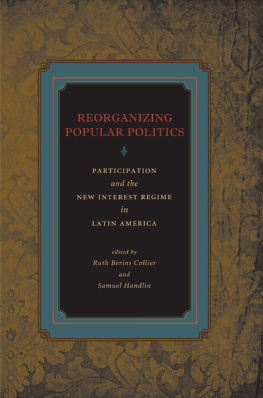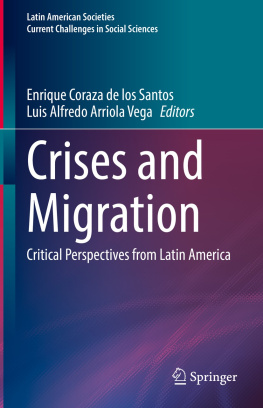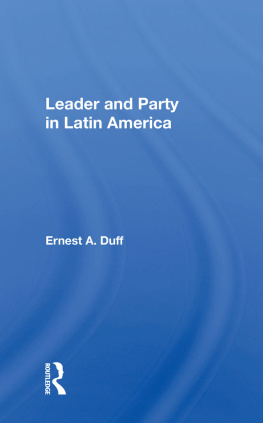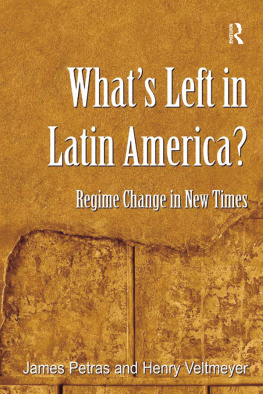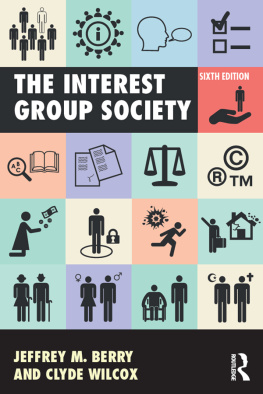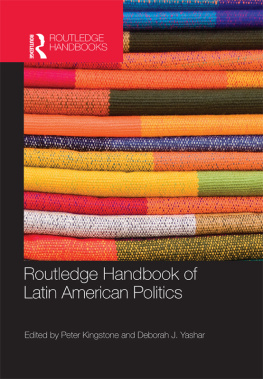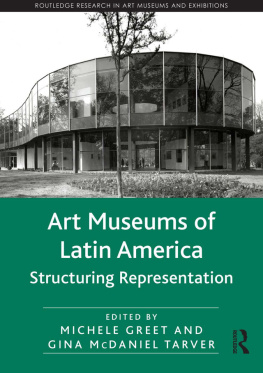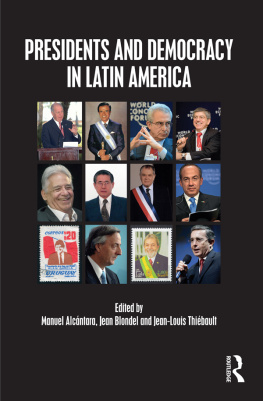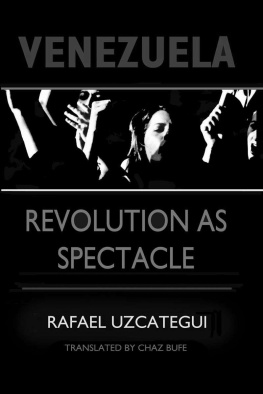Library of Congress
Cataloging-in-Publication Data
Reorganizing popular politics : participation and the new interest regime in Latin America / edited by Ruth Berins Collier and Samuel Handlin.
p. cm.
Includes bibliographical references and index.
Summary: A comparative analysis of lower-class interest politics in Argentina, Chile, Peru, and Venezuela. Examines the proliferation of associations in Latin Americas popular-sector neighborhoods, in the context of the historic problem of popular-sector voice and political representation in the regionProvided by publisher.
ISBN 9780-271035604 (cloth : alk. paper)
ISBN 9780-271035611 (pbk. : alk. paper)
1. Working classLatin AmericaPolitical activity.
2. Social movementsLatin America.
3. Pressure groupsLatin America.
4. Political participationLatin America.
I. Collier, Ruth Berins.
II. Handlin, Samuel. JL966.R387 2009
322.4098dc22 2009017035
Copyright 2009
The Pennsylvania State University
All rights reserved
Printed in the United States of America
Published by
The Pennsylvania State University Press,
University Park, PA 16802-1003
The Pennsylvania State University Press
is a member of the
Association of American University Presses.
It is the policy of The Pennsylvania State University Press to use acid-free paper. Publications on uncoated stock satisfy the minimum requirements of American National Standard for Information SciencesPermanence of Paper for Printed Library Material, ANSI Z39.481992.
This project is collaborative in the deepest sense. Unlike most edited volumes, which are bound more loosely by a common topic and perhaps some common guidelines, this volume, which had its genesis in a Berkeley graduate seminar, was conceived from the beginning as a unified whole. In the argot that developed among the collaborators, we came to call the project CIRELA , an acronym for Comparative Infrastructure of Representation in Latin America, and the participants cirelistas. Although the chapters are associated with specific authors, they are based empirically on data from the same questionnaires, written collaboratively by the original cirelista team, which consisted of Ruth Berins Collier, Diana Kapiszewski, and Jason Seawright, in addition to Christopher Cardona, Sebastin Mazzuca, and Sally Roever. All the authors thank the last three for the way they gave tirelessly to this endeavor, not only joining the others in endless hours into the night over untold numbers of pizzas (even in the Berkeley gourmet ghetto, excellent pizza can get tiresome), but also participating in the survey administration in the field. The cirelistas are grateful to Laura Stoker, who in her inimitable way discussed issues of sampling and survey design with unparalleled clarity and enthusiasm. We also acknowledge Peter Houtzager, John Harriss, and Adrin Gurza Lavalle, who contributed to the survey construction.
The empirical analysis is based on data from two surveys, a survey of individuals, dubbed the Qaire, and a survey of associations, or the Agram. Each was administered in four capital cities in Latin America: Buenos Aires, Argentina; Santiago, Chile; Lima, Peru; and Caracas, Venezuela. We have relied on the help of many people in each country, without whom the data collection would not have been possible. The Qaire was administered by a professional survey firm in each country: TNS Gallup of Argentina, Statcom in Chile, APOYO in Peru, and COMO in Venezuela. The Agram was administered by a cirelista country coordinator (see ) along with local researchers, who were indispensable in sharing their expertise in general and in helping to select and oversee a local team of interviewers. We want to thank the association leaders who devoted time to answering the survey questions and were usually enthusiastic about sharing their activities, organizational goals, and plights with our research team.
In Argentina, we benefited greatly from the generosity of the Centro de Estudios de Estado y Sociedad, CEDES , in Buenos Aires, which provided space, access to their information, and continual support for the implementation of the project. We especially thank Ins Gonzlez Bombal and Mario Roitter for their generous support and advice as well as CEDESS director, Silvina Ramos. Several sociologists at the Universidad Nacional de General Sarmiento also provided advice and support, especially Maristella Svampa and Pablo Bonaldi. Several people participated in the implementation of the survey of association leaders and in the collection of secondary data. Among the interviewers, we would like to acknowledge the outstanding work provided by Gabriela Alach, Liliana Alegre, Arturo A. Fernndez, Mara Gioaninni, Julieta Grimberg, Carolina Kostenbaum, Mnica A. Marra, Ulises Pallares, and Juan Ignacio Vallejos. A team of interviewers trained at the Universidad de General Sarmiento, composed of Mariana Barattini, Lorena Bottaro, Luca Canel, Marina Garca, and Fabiana Leoni, provided outstanding work and was key in implementing the survey of association leaders in half of the focus districts. Gabriela Alach worked as assistant field coordinator during the first part of the implementation of the survey of association leaders. Alejandro Bonvecchi provided help coordinating the data entry. Juan Ignacio Vallejos and Julieta Grimberg provided research assistance and collected all the secondary data gathered for the project.
In Chile, the field coordinator for the Agram was Professor Marco A. Fernndez (Instituto de Ciencia Poltica de la Universidad Catlica de Chile), and the field assistant was Francisco Javier Carreras Vicua (who was, at the time, pursuing an MA at the Universidad Alberto Hurtado). The members of the team of student interviewers who administered the Agram were Alejandro Maureira Matta, Carlos Vsquez Bustos, Carolina Bascun Escobar, Carolina Muena Moyano, Carolina Olsen Hernndez, Claudia Casal Cordero, Esteban Ferreira Urrea, Felipe Andrs Padilla Poblete, Francisca Laguardia Sotomayor, Gloria Alejandra de la Fuente Gonzlez, Javier Durbalin Estrada, Jazmn Voigth Vallejos, Karen Contreras Orellana, Luz Cecilia Soto Mendoza, Mauricio Leone Araya, and Patricio Orlando Ibarra Cifuentes. We gratefully acknowledge Paulina Valenzuela and the entire staff of Statcom Estadsticas Consultores Ltda. who did an excellent job administering the Qaire, and doing data input and database construction for both the Qaire and the Agram. Katty Kauffman provided generous hospitality, encouragement, and expertise on Chile. Professor Gabriel Davidovics (Centro de Estudios de Opinin Pblica, Universidad de Chile) kindly gave patient assistance. Finally, we would like to thank the staff of various municipalities, including Cerro Navia, Estacin Central, Huechuraba, La Pintana, Pealoln, and San Ramn, who were helpful in various ways as we conducted our research in their areas.
The Peru research team received guidance from Julio Caldern, as local adviser, and Luis Vicua Muoz, who served as field coordinator. We thank them both for their help across many aspects of the fieldwork. Two Berkeley undergraduates were very helpful in the field, Azrael Guevara and Camilo Romero. We also acknowledge the contributions made by the Agram interviewers: Masha Vsquez Luque, Yerson M. Guarnz Aranda, Dania Franco Vaisman, Mara del Rosario Castro Bernardini, Flix Lossio, Juan Alberto Rocha, Sal Vicua Montaez, Vernica Boggio. Finally, a number of individuals from the survey firm Apoyo S.A. deserve special thanks for their valuable role in helping to pretest the Qaire in Lima: Sandra Manrique Becerra, Jorge Morales, Luis Caceda Zavala, Silvia Raquel Durand, Silvia Mas Lozada, Agustn Asenjo Valdivia, and Patricia Esther Quirz Ruz.

